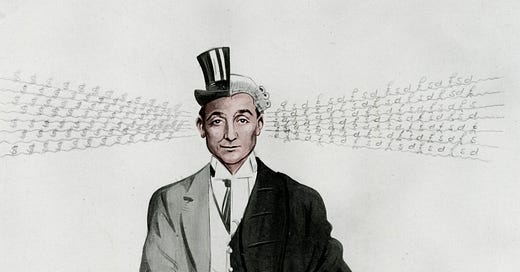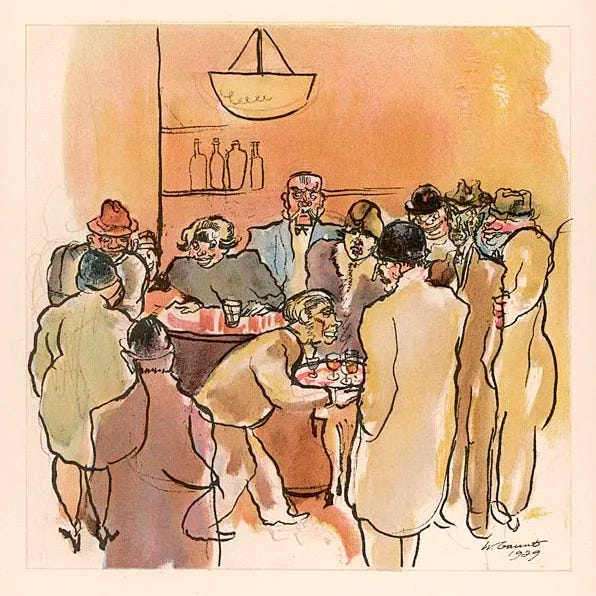Thank you for reading Maynard’s War, and welcome to my new subscribers. Chapter 28 will be published next Sunday, 22nd June at 11am UK time. Do please share with anyone you think might be interested.
If you’ve only just discovered Maynard’s War and would like to start at the beginning, then please click this button:
December 1917
Vanessa was trying to work. She now had her studio at Charleston exactly as she wanted it. And most days, when Duncan and Bunny were at work, if the light was reasonable she was able to paint for hours at a time, generally with pleasing results.
Today was proving impossible however, as the men were arguing so loudly that even the thick walls of the farmhouse were useless against the din. So violent had these rows become that she was reluctant to intervene for fear of getting hurt herself. She had no choice but to listen to their childish squabbles wherever in the house or garden they decided to take them. She sat in the tatty old arm chair by the window to listen.
“So you thought you’d hide in the kitchen, presumably in the hope of finding Vanessa here, and that she’d protect you?” Duncan screamed.
“Oh Duncan, do stop. I’m not sure what else I can do or say.” Bunny pleaded.
“You could start by promising me that you won’t see that woman again.”
“Why can’t you say her name? She has a name you know. Why can’t you say it? Her name is Alix, and I love her.”
“Oh. So you’re happy to tell me about it now. Why couldn’t you have told me before. It was so humiliating finding out like that, having to pretend that I already knew when the truth was written all over my face. Why did you have to keep it a secret?”
“Because I knew how jealous you’d be.”
“I’m not jealous.” Duncan’s screaming hit a new peak. “It’s a question of trust. How can we be together if you won’t tell me what you’re doing?”
“Who I’m seeing, you mean.”
“It’s not as if Alix is the first, is it? You’ve been seeing Barbara Hiles on and off for months, haven’t you?”
“Yes, I bloody well have. So what?”
“Does our relationship mean nothing to you? Do I mean nothing?” Vanessa could make out the familiar sound of Duncan sobbing. “I don’t understand how you can hurt me so much,” he continued.
“I don’t want to hurt you Duncan, but this isn’t enough for me.”
“Why not?”
“Look at us. Doesn’t this ‘arrangement’ strike you as rather peculiar, not to mention lopsided?”
“What do you mean?”
“You and Vanessa playing happy families, with me on hand to give you what she can’t.”
“That’s not how it is.”
“We’ve both been indulging you for far too long. I don’t know how Vanessa does it, but I can’t do it any more.”
“Don’t say that,” Duncan was hysterical now.
“What do you expect me to say? You insist on the right to have two lovers, but I have to remain at your beck and call, with no life of my own.”
“Well perhaps you owe me something, after all I’ve done for you.”
“All you’ve done for me? Do you think you’d have survived five minutes on that bloody farm without me to cover for you? It was Vanessa who invited me here. And it was Vanessa who begged me to stay when I needed to get away from you.”
“Why didn’t you leave then, if you’re so independent?”
“I bloody well wish I had. I should have gone months ago and made a proper life for myself.”
Vanessa heard Bunny storm out of the kitchen. Against her better judgement she opened the door and headed downstairs, but Duncan had also left. She fetched a glass of water and sat down at the kitchen table. A few minutes later, the door opened and Keynes appeared.
“Maynard, what are you doing here? I thought you were in America.”
“I got back a few days ago. London is too depressing so I thought I’d come down. I was going to let you know but the telegraph office at Victoria was shut.”
“Well I’m delighted to see you. Now tell me, how was your trip?”
“Ghastly, quite frankly. I fail to understand how centuries of cultural progress can be reversed in so short a time.”
Vanessa laughed. “It can’t be that bad, surely?”
“You wouldn’t believe it. Most of the Americans I spoke to, and I admit for the most part they were either politicians or bankers, so perhaps it isn’t entirely fair to generalise, but most of them wouldn’t survive five minutes in Whitehall. It’s not that they lack intelligence, rather they have no real substance, and no sense of a world beyond their own borders.”
“Who did you go with? Were they good company at least?”
“Lord Reading. He has an excellent mind and is incredibly cultured. Good company throughout. In fact, he should be the next Ambassador.”
“To the United States?”
“Yes.”
“What about the current Ambassador?”
“Imbecile. I said as much in my official report. If the Foreign Office has any sense at all, they’ll pension him off right away. Honestly Vanessa, the man has no idea.”
“You must have come across somebody you liked over there.”
“I did. The Negroes: charming and cultured to a man. Interested in what’s going on and pleased to hear the opinion of an outsider. But of course none of them have any power.”
“And what about the war?”
“That’s the worst of it: now they’re in they think it’s their war. The Germans have to be defeated at all costs. The threat of American involvement was our last chance of a negotiated peace. It’ll drag on for at least another year, now.”
“You’re not here to cheer me up then?”
“Why, do you need cheering up?”
“Had you arrived five minutes earlier, you’d have witnessed Duncan and Bunny scratching each other’s eyes out.”
“Honestly. Do they not realise that thousands of young men are losing their lives every day, not fifty miles from here,” he said angrily before noticing she was close to tears. “Vanessa, I’m sorry.” He took her hand in his and patted it in the way that men who struggle to distinguish between women and horses do. “So things are no better between them?”
“Rather worse, I’m afraid. Duncan found out about Bunny’s affair with Alix Sargant-Florence, and as you can imagine, he’s distraught about it.”
“Duncan does get so jealous. Such a sensitive man, but quite unable to put himself in someone else’s shoes. I’m not surprised though, Alix is a very beautiful woman. Is Bunny serious?”
“I don’t know. He’s as much of an emotional cripple as Duncan. When he’s here he longs to be with Alix, but when he’s there he finds no meaning in the relationship and pines for Duncan.”
“This is all your fault you know,” he said, sternly.
“I think that’s a little unfair. I know I brought Bunny here to make sure I could keep hold of Duncan, but I hadn’t bargained on either of them becoming so destructively dependent on each other.”
Keynes sighed and ran his hand through his hair. “I don’t know. This damn war has clouded everyone’s judgement. In normal circumstances the three of you wouldn’t have had to live like this, with the boys forced to do work for which they are totally unsuited.”
“I just don’t know how it’s going to end.”
“It’ll end when the war ends and life begins to return to normal.”
Before Vanessa could move the conversation on, they were disturbed by Duncan and Bunny arguing upstairs.
“Why do you have to make everything so complicated? Why am I not enough for you? Why do you have to go off with these women?” Duncan demanded.
“Why do you have to sleep with Vanessa? Presumably because I’m not enough for you. Or does the whole world always have to revolve around you Duncan?” It sounded as if Bunny was shouting through tears.
“No. But I need you Bunny. I couldn’t go on if you left.”
“I’m sorry but this is becoming too painful, and quite frankly, too much trouble.”
“Too much trouble? What a horrible thing to say.” Silence fell over the house.
“Oh Lord. How long has it been like this?” Keynes asked.
“Today, about three hours. In total, three months.”
“It must make life very difficult for you.”
“Yes, well, neither of them think very much about how I feel.”
“Tell me, um, you and, er,”
“Me and Bunny? Really Maynard, I may be responsible for this miserable situation, but I’m not that stupid. Although he has tried it on a few times.”
“Perhaps the Victorians had it right all along: monogamy, fidelity, keeping it all in the family, as it were.”
“Except they didn’t, they were hypocrites. And in any case, you couldn’t live like that and neither could I. It’s just a different set of difficulties to be dealt with.”
“So what’s going to happen, with Duncan and Bunny, I mean?”
“Bunny will leave, eventually.”
“And where will that leave you and Duncan?”
“I don’t know. To be honest, I can’t bear to think about it.”
As she finished, they heard two sets of footsteps running down the stairs and Duncan shouting: “Don’t think you can get away that easily, come back here.”
The kitchen door burst open. Duncan came in, out of breath, looking dishevelled with blood running from a cut on his lip followed by Bunny, whose left eye was so swollen it had almost closed. “Don’t you dare hit me again, or I’ll really let you have it,” Duncan screamed, shaping to hit Bunny but suddenly noticing Vanessa and Maynard. “Maynard? I didn’t know you were here,” he said.
“Hello Duncan, Bunny. I see the war has made it to Sussex.”
Despite his feelings for Duncan, it was Vanessa’s situation that most troubled Keynes. The boys had been on their best behaviour for the rest of his stay, but he felt dreadful for abandoning Vanessa. He had spoken privately to both Duncan and Bunny and struggled to see any prospect for improvement, at least as long as the war continued. Duncan had been at his petulant worst; quite unable to see the situation from either Bunny or Vanessa’s perspective. His judgement was clearly clouded by tiredness, the kind of tiredness that builds up over months, years even. He hated the work on the farm; he hated the fact that he wasn’t very good at it, and that he was dependent on Bunny. He hated having so little time for painting. And he hated himself for his failure to use what little time he did have productively. But Bunny was right: it was all about Duncan. Nobody else mattered.
Bunny had proved more insightful about the situation, however, and also about Duncan’s relationship with Vanessa. He confirmed what Vanessa had said; that he was only at Charleston because he had to be. He had no interest in a long term relationship with Duncan, had always preferred the company of women and rather regretted becoming involved with Duncan in the first place. He was immensely grateful to Vanessa for creating a sanctuary for them both; he didn’t know how else he might have avoided conscription, but he wondered at the price Vanessa was forced to pay. He wasn’t sure Vanessa and Duncan would have a future together, even once the war was over. This made Keynes feel even more desperate for Vanessa. She seemed to spend her life trying to help others in the hope that one day her good deeds would somehow deliver her a little happiness.
On his return to work he had been cheered by a note left for him by Lord Lansdowne. “My Dear Keynes,” the note read, “I hope you had a productive trip. Thought you might like to know that I’m having another go.” The note was dated 10th November. Keynes had been away nearly a month. Had he been able to speak to Lansdowne, he would have advised against it. In the event the public reaction to what quickly became known as the Lansdowne Letter, once it had been published in the Daily Telegraph, gave some cause for optimism.
It was true that Lloyd George had thrown him out of Cabinet the morning after publication, but elsewhere there seemed to be an attentive audience for Lansdowne’s wise council. It was a long letter, but elegantly written and exquisite in its logic. It had still provoked an avalanche of hostile criticism, but a year after his first effort to persuade the Cabinet to sue for peace, this time he found some allies, most notably Bonar Law.
Keynes had read the letter in the New York Times where it had been reprinted in full the day he’d arrived in the United States. Alongside the letter, the Times had published a vitriolic attack on its sentiment by the former President, Theodore Roosevelt. Roosevelt was considered a crank by everyone whose opinion Keynes trusted. He even turned out to be close friends with Ambassador Spring-Rice. In the days following publication, much of the press dismissed Lansdowne’s plea for an honourable end to the war as the naïve words of an appeasing idealist. Nonetheless, his plan was gaining some ground. Keynes was further encouraged by reports that President Wilson was working on a fourteen point plan for peace. Perhaps Wilson reckoned that with the weight of numbers now favouring the allies, the Germans would accept peace terms before the inevitable came to pass.
Keynes opened his briefcase and removed the file of newspaper cuttings in which he had preserved a copy of Lansdowne’s letter and read it again. As previously, he was impressed by a passage which he had circled in pencil. “To end the war honourably would be a great achievement; to prevent the same curse falling upon our children would be a greater achievement still.”
Another passage made mention of the importance of institutions of binding arbitration if future wars were to be avoided. He made a mental note to ask Leonard Woolf if he’d had a hand in drafting the letter. It now seemed obvious to Keynes that such institutions would be crucial to the success of the post-war international order.
Thanks for reading Maynard’s War. Subscribe for free to ensure you never miss a chapter. Or take out a paid subscription and help me to deliver chapters on time.
And if you’re interested in all things Bloomsbury, and specifically 20th century British art, do check out Victoria K. Walker’s Beyond Bloomsbury. It’s fabulous.







